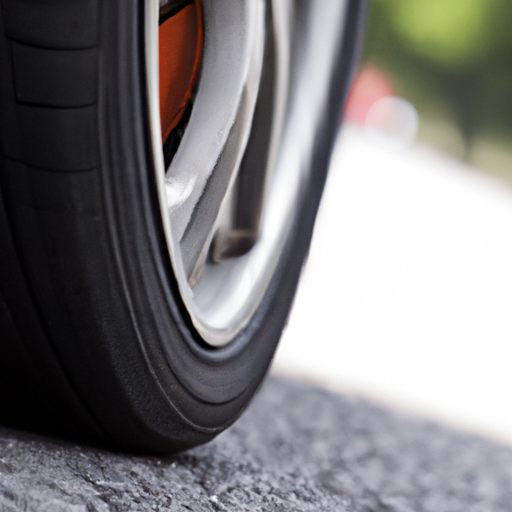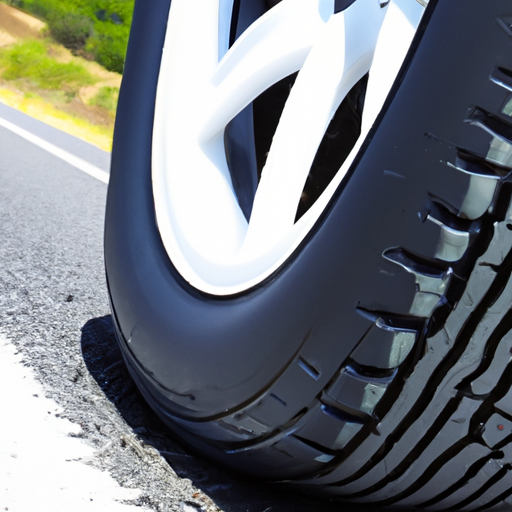When it comes to warm weather driving, summer tires have long been the go-to option for their exceptional grip and performance. But what if you prefer not to invest in a set of dedicated summer tires? Are there any alternatives that can provide similar benefits? In this article, we explore the options available to those seeking alternatives to summer tires for warm weather driving. From all-season tires to performance all-season tires, we’ll examine their features, pros, and cons to help you make an informed decision for your next adventure on the road.

All-Season Tires
All-Season Tires Overview
When it comes to warm weather driving, having the right tires can make all the difference. One popular option for warm weather driving is all-season tires. As the name suggests, these tires are designed to provide traction and performance in a variety of weather conditions, including both hot summers and mild winters. They are a versatile choice that many drivers prefer to use year-round instead of switching between dedicated summer and winter tires.
How All-Season Tires Perform in Warm Weather
All-season tires are specifically designed to perform well in warm weather conditions. They are constructed with a unique tread pattern and rubber compound that allows them to maintain their grip on dry, hot pavement. This means that even on scorching summer days, you can count on your all-season tires to provide you with reliable performance and handling.
Pros of Using All-Season Tires for Warm Weather Driving
One of the major advantages of using all-season tires for warm weather driving is their versatility. With all-season tires, you don’t have to worry about switching between different sets of tires throughout the year. They are designed to handle various road conditions, including dry pavement, wet roads, and even light snow if you happen to encounter it during the cooler months.
Another advantage of using all-season tires is their longevity. Since you are not constantly swapping between different sets of tires, all-season tires tend to last longer compared to dedicated summer or winter tires. This can save you money in the long run, as you won’t have to replace your tires as frequently.
Cons of Using All-Season Tires for Warm Weather Driving
While all-season tires offer versatility and longevity, they do have some drawbacks when it comes to warm weather driving. One of the main disadvantages is their performance compared to dedicated summer tires. All-season tires are designed to work in a wide range of conditions, which means they may not excel in any particular area. In hot weather, their performance may not be as optimal as summer tires, especially when it comes to cornering and braking.
Another drawback of using all-season tires for warm weather driving is their tread wear. Because all-season tires are designed to be used year-round, they may wear down faster than dedicated summer tires. This is especially true if you frequently drive on hot pavement, as the heat can cause the rubber to degrade more quickly.
Winter Tires
Winter Tires Overview
When the temperature drops and snow starts to fall, having the right tires is crucial for safe and reliable driving. Winter tires, also known as snow tires, are specifically designed to provide superior traction and handling in cold weather conditions. They are constructed with a specialized rubber compound and tread pattern that are optimized for snowy, icy, and slushy roads.
How Winter Tires Perform in Warm Weather
While winter tires excel in cold and snowy conditions, they are not the best option for warm weather driving. The rubber compound used in winter tires is designed to remain flexible in freezing temperatures, which helps to enhance traction on snowy or icy roads. However, in warm weather, the rubber can become too soft, which can lead to decreased performance and increased tire wear.
Pros of Using Winter Tires for Warm Weather Driving
There are few advantages to using winter tires for warm weather driving. One potential benefit is the increased tread life. Winter tires are typically made with a harder rubber compound compared to summer or all-season tires. This harder rubber can help prolong the life of the tires when driving in warm weather conditions.
Another advantage of using winter tires in warm weather is their ability to handle wet roads. Winter tires are designed with deep grooves and sipes that help to channel water away from the tire’s surface, reducing the risk of hydroplaning. This can be beneficial in areas where rainfall is common, even during the warmer months.
Cons of Using Winter Tires for Warm Weather Driving
The main disadvantage of using winter tires for warm weather driving is the decreased performance. Winter tires are specifically designed for cold temperatures and snowy conditions, so their performance on dry, hot pavement may be compromised. The softer rubber compound can lead to reduced grip, longer braking distances, and decreased handling capabilities.
In addition to decreased performance, using winter tires in warm weather can also result in increased tire wear. The softer rubber compound can wear down more quickly on dry, hot surfaces, leading to a shorter overall lifespan for the tires. This means that you may need to replace your winter tires more frequently if you choose to use them in warm weather conditions.
High-Performance All-Season Tires
High-Performance All-Season Tires Overview
For drivers looking for a balance between performance and year-round usability, high-performance all-season tires are a popular choice. These tires are designed to provide excellent traction and handling in both wet and dry conditions, making them suitable for warm weather driving. They offer enhanced performance compared to standard all-season tires, making them a great option for those seeking a sporty driving experience.
How High-Performance All-Season Tires Perform in Warm Weather
High-performance all-season tires are specifically engineered to deliver superb performance in warm weather conditions. With their advanced tread patterns and specially formulated rubber compounds, these tires provide excellent grip and responsive handling on dry, hot pavement. This means that you can enjoy the benefits of a high-performance tire while still having the versatility for year-round use.
Pros of Using High-Performance All-Season Tires for Warm Weather Driving
One of the key advantages of high-performance all-season tires for warm weather driving is their exceptional grip and handling. These tires are designed with performance in mind and can provide excellent traction on both dry and wet roads. This is particularly beneficial for those who enjoy spirited driving or want responsive handling in various weather conditions.
High-performance all-season tires also offer an excellent compromise between summer and all-season tires. While they may not perform as well as dedicated summer tires in extreme heat, they are a significant improvement over standard all-season tires. Their enhanced grip and handling capabilities make driving in warm weather more enjoyable and safe.
Cons of Using High-Performance All-Season Tires for Warm Weather Driving
Despite their advantages, high-performance all-season tires have a few drawbacks when it comes to warm weather driving. The first is their decreased performance compared to dedicated summer tires. While they may offer better grip and handling than standard all-season tires, they may not quite match the performance levels of dedicated summer tires, especially when pushed to their limits.
Another potential disadvantage is the trade-off between performance and tread life. High-performance all-season tires tend to have softer rubber compounds, which can provide better traction but also wear down more quickly. If you frequently drive in warm weather conditions, the softer rubber may result in faster tread wear and the need for more frequent tire replacements.
Touring Tires
Touring Tires Overview
If comfort and long-lasting tread are your priorities for warm weather driving, touring tires are an excellent option to consider. These tires are designed for drivers who value a smooth and quiet ride, along with excellent tread life. While they may not offer the same level of performance as high-performance tires, they provide a comfortable driving experience that is well-suited for long trips and daily commuting.
How Touring Tires Perform in Warm Weather
Touring tires perform admirably in warm weather conditions, providing a smooth and comfortable ride for drivers. With their unique tread patterns and specialized rubber compounds, they offer good traction and stability on dry, hot surfaces. While they may not deliver the same level of performance as high-performance tires, their focus on comfort and longevity makes them an ideal choice for warm weather driving.
Pros of Using Touring Tires for Warm Weather Driving
One of the main advantages of touring tires for warm weather driving is their focus on comfort. These tires are designed to provide a smooth and quiet ride, absorbing road imperfections and reducing noise levels. This can be particularly beneficial for longer trips or daily commutes in warm weather, as the comfortable ride enhances overall driving enjoyment.
Another benefit of touring tires is their long tread life. These tires are constructed with durable rubber compounds that are designed to withstand high temperatures and offer excellent wear resistance. This means that touring tires can last longer in warm weather conditions, potentially saving you money in the long run by reducing the need for frequent tire replacements.
Cons of Using Touring Tires for Warm Weather Driving
While touring tires offer comfort and long-lasting tread, they do have some limitations when it comes to warm weather driving. The first drawback is their decreased performance compared to high-performance tires. Touring tires are not engineered to provide the same level of grip and handling as high-performance tires, so if you’re looking for a sportier driving experience, touring tires may not be the best choice.
Another potential disadvantage is their performance on wet roads. While touring tires typically perform well on dry pavement, their grip and traction may be compromised on wet or rainy surfaces. This can result in longer braking distances and reduced stability, which may make driving in wet conditions more challenging.

All-Terrain Tires
All-Terrain Tires Overview
When it comes to off-road driving and tackling challenging terrain, all-terrain tires are the go-to choice. These tires are designed to handle a variety of surfaces, including gravel, mud, and rocky terrain. While they are primarily known for their off-road capabilities, all-terrain tires can also be a suitable option for warm weather driving, especially for those who enjoy outdoor activities or have to navigate rough road conditions.
How All-Terrain Tires Perform in Warm Weather
All-terrain tires perform well in warm weather conditions, making them a versatile option for drivers who seek adventure or frequently encounter unpaved roads. With their deep tread patterns and aggressive sidewalls, all-terrain tires provide excellent traction on dry surfaces, allowing you to confidently navigate sandy or rocky roads. They also offer good stability and durability, making them well-suited for warm weather driving.
Pros of Using All-Terrain Tires for Warm Weather Driving
One of the significant advantages of all-terrain tires for warm weather driving is their capability to handle rough or challenging road conditions. These tires are designed to provide excellent traction on various surfaces, including gravel, dirt, and rocky terrain. This can be particularly advantageous if you frequently drive on unpaved roads or enjoy outdoor activities such as camping or hiking.
In addition to their off-road prowess, all-terrain tires offer good stability and durability on dry pavement. The robust construction and rugged design of these tires ensure they can withstand the wear and tear of regular warm weather driving, making them a long-lasting option for those who require extra toughness.
Cons of Using All-Terrain Tires for Warm Weather Driving
While all-terrain tires excel in off-road and rough road conditions, they do have some drawbacks when it comes to warm weather driving on paved roads. One of the main disadvantages is their noise level. Due to their aggressive tread patterns and larger blocks, all-terrain tires tend to produce more road noise compared to standard highway or touring tires. This can be a consideration for those who prioritize a quiet and comfortable driving experience.
Another potential drawback is the decreased fuel efficiency associated with all-terrain tires. Their aggressive tread design and larger blocks contribute to increased rolling resistance, which translates to higher fuel consumption. If you frequently drive long distances or value fuel efficiency, all-terrain tires may not be the most economical option.
Summer Performance Tires
Summer Performance Tires Overview
For drivers who prioritize enhanced performance and handling in warm weather conditions, summer performance tires are an excellent choice. These tires are specifically designed to deliver exceptional grip, traction, and cornering capabilities on dry and hot pavement. They are a popular option for driving enthusiasts who enjoy spirited driving and want precise handling and responsiveness.
How Summer Performance Tires Perform in Warm Weather
Summer performance tires are engineered to excel in hot weather conditions, providing drivers with the ultimate driving experience. Their unique tread compounds and tread patterns allow these tires to maintain their grip on dry pavement, offering excellent traction and stability. Whether you’re driving on winding roads or blasting down the highway, summer performance tires deliver the confidence and performance you expect.
Pros of Using Summer Performance Tires for Warm Weather Driving
The main advantage of using summer performance tires for warm weather driving is their impressive performance capabilities. These tires are designed to optimize grip and handling in dry conditions, allowing you to push your vehicle to its limits without compromising safety. Whether you’re navigating sharp turns or accelerating on straightaways, summer performance tires provide the responsiveness and precision needed for an exhilarating driving experience.
Another positive aspect of summer performance tires is their braking performance. These tires are engineered to deliver shorter braking distances on dry pavement, allowing you to stop quickly and safely. This can be particularly beneficial in emergency situations or when driving at high speeds, where every inch can make a difference.
Cons of Using Summer Performance Tires for Warm Weather Driving
The primary disadvantage of summer performance tires is their limited suitability in wet or rainy conditions. While they excel on dry pavement, their performance on wet roads may be compromised. The tread patterns of summer performance tires are not optimized for water dispersal, which can result in reduced traction and increased risk of hydroplaning in rainy or wet conditions.
Another drawback of summer performance tires is their decreased tread life compared to other tire types. The specialized rubber compounds and tread designs that provide enhanced grip and performance tend to wear down more quickly on dry pavement. This means that you may need to replace your summer performance tires more frequently, especially if you frequently engage in spirited driving.

Grand Touring Tires
Grand Touring Tires Overview
If comfort, longevity, and a smooth ride are your top priorities for warm weather driving, grand touring tires are an excellent option to consider. These tires are specifically designed to provide a luxurious driving experience, with a focus on comfort, low noise levels, and long tread life. They offer a superb balance between comfort and performance, making them a popular choice for long trips and daily commuting.
How Grand Touring Tires Perform in Warm Weather
Grand touring tires perform exceptionally well in warm weather conditions, offering drivers a smooth and quiet driving experience. With their unique tread designs and specialized rubber compounds, these tires provide good traction and stability on dry, hot pavement. They are engineered to deliver a comfortable ride while still offering reliable performance for everyday driving.
Pros of Using Grand Touring Tires for Warm Weather Driving
One of the main advantages of grand touring tires for warm weather driving is their focus on comfort. These tires are specifically designed to provide a plush and quiet ride, minimizing road noise and absorbing any irregularities on the road. This makes them an excellent choice for long trips or daily commuting in warm weather, where comfort is essential.
Another benefit of grand touring tires is their long-lasting tread life. These tires are constructed with durable rubber compounds that can endure high temperatures and offer excellent wear resistance. This means that grand touring tires can provide extended tread life in warm weather conditions, potentially saving you money by reducing the frequency of tire replacements.
Cons of Using Grand Touring Tires for Warm Weather Driving
While grand touring tires offer a comfortable and long-lasting driving experience, they may not deliver the same level of performance as high-performance or summer tires. The trade-off for comfort and tread life is a slightly compromised grip and handling. If you prioritize aggressive driving or more responsive handling, grand touring tires may not provide the level of performance you desire.
Additionally, grand touring tires may not perform as well on wet surfaces compared to high-performance or all-season tires. While they are designed to offer excellent traction on dry pavement, their performance may be compromised on wet or rainy roads. This can result in longer braking distances and reduced stability, which can make driving in wet conditions less reassuring.
All-Weather Tires
All-Weather Tires Overview
If you want the convenience of one set of tires that can handle a variety of weather conditions, all-weather tires are a practical and versatile choice. These tires are specifically designed to provide reliable performance in both warm and cold weather, making them a popular option for drivers who don’t want to switch between summer and winter tires. They offer a balance between the grip of winter tires and the performance of all-season tires.
How All-Weather Tires Perform in Warm Weather
All-weather tires perform well in warm weather conditions, providing drivers with a dependable and comfortable driving experience. With their unique tread patterns and specialized rubber compounds, these tires offer good traction and stability on dry pavement. They are designed to maintain their performance across a wide range of temperatures, making them well-suited for year-round use.
Pros of Using All-Weather Tires for Warm Weather Driving
The primary advantage of using all-weather tires for warm weather driving is their versatility. These tires are designed to handle a variety of road conditions and temperatures, making them a suitable option for drivers who want a single set of tires that can be used year-round. With all-weather tires, you don’t have to worry about switching between different sets of tires for different seasons, providing convenience and cost savings.
Another benefit of all-weather tires is their performance in both wet and dry conditions. These tires are engineered to offer reliable traction and stability on dry pavement, while also providing good grip on wet roads. This can be particularly advantageous in areas where rainfall is common or if you frequently encounter wet or damp conditions during the warmer months.
Cons of Using All-Weather Tires for Warm Weather Driving
While all-weather tires offer convenience and versatile performance, they do have some limitations when it comes to warm weather driving. The first drawback is their performance compared to dedicated summer tires. All-weather tires are designed to provide a balanced performance across different weather conditions, which means they may not excel in extreme heat or deliver the same level of grip and handling as summer tires.
Additionally, all-weather tires may not provide the same level of tread life as dedicated summer tires. The all-weather design compromises on some aspects of tire performance to provide versatility, which can result in faster tread wear. If you frequently drive in warm weather conditions, the softer rubber compound used in all-weather tires may wear down more quickly, requiring more frequent tire replacements.

Performance Winter Tires
Performance Winter Tires Overview
For drivers who want enhanced winter performance without compromising on high-speed capabilities, performance winter tires are an excellent choice. These tires are specifically designed to provide exceptional grip and control in snowy and icy conditions, making them a popular option for those who live in regions with harsh winters. While their primary focus is on winter performance, they can still be suitable for warm weather driving depending on the specific tire model.
How Performance Winter Tires Perform in Warm Weather
While performance winter tires excel in cold weather conditions, their performance in warm weather may be compromised. The rubber compounds used in performance winter tires are designed to remain flexible in freezing temperatures, which enhances grip on snowy and icy roads. However, in warm weather, the rubber can become too soft, leading to decreased performance and increased tire wear.
Pros of Using Performance Winter Tires for Warm Weather Driving
There are few advantages to using performance winter tires for warm weather driving. One potential benefit is their increased tread life. Performance winter tires are generally made with a harder rubber compound compared to standard winter tires, which can help prolong the life of the tires when driving in warm weather conditions.
Another advantage of performance winter tires in warm weather is their improved performance compared to standard all-season or winter tires. While they may not deliver the same level of grip and handling as dedicated summer tires, performance winter tires typically offer better performance characteristics compared to standard winter tires. This can provide a safer and more enjoyable driving experience in warm weather conditions.
Cons of Using Performance Winter Tires for Warm Weather Driving
The main disadvantage of using performance winter tires for warm weather driving is their decreased performance. While they may offer better grip and handling compared to standard winter tires, they may not match the performance levels of dedicated summer or high-performance tires, especially in hot weather conditions. The soft rubber compound used in performance winter tires may result in reduced grip, longer braking distances, and decreased handling capabilities.
Another potential disadvantage is the increased tire wear associated with performance winter tires in warm weather. The softer rubber compound used in these tires can wear down more quickly on dry, hot pavement, leading to a shorter overall lifespan for the tires. This means that you may need to replace your performance winter tires more frequently if you choose to use them in warm weather conditions.
All-Season Performance Tires
All-Season Performance Tires Overview
For drivers who want a blend of all-season versatility and enhanced performance, all-season performance tires are a popular choice. These tires are designed to provide excellent traction and handling in a variety of weather conditions while maintaining some of the performance characteristics of high-performance tires. They are a versatile option for drivers who want year-round usability without sacrificing performance.
How All-Season Performance Tires Perform in Warm Weather
All-season performance tires perform well in warm weather conditions, making them a suitable option for drivers who desire enhanced performance without switching to dedicated summer tires. With their unique tread designs and specialized rubber compounds, these tires provide good grip and handling on dry, hot pavement. They offer a balance between all-season usability and enhanced performance.
Pros of Using All-Season Performance Tires for Warm Weather Driving
The primary advantage of using all-season performance tires for warm weather driving is their versatility. These tires are designed to excel in a variety of weather conditions, making them suitable for year-round use. With all-season performance tires, you don’t have to worry about switching between different sets of tires or compromising on performance during the warmer months.
Another benefit of all-season performance tires is their enhanced grip and handling compared to standard all-season tires. These tires are engineered to deliver better traction and cornering capabilities on dry surfaces, offering a more engaging and sporty driving experience. If you enjoy spirited driving or want improved performance in warm weather, all-season performance tires are a great option.
Cons of Using All-Season Performance Tires for Warm Weather Driving
While all-season performance tires offer versatility and enhanced performance, they do have some limitations. The first drawback is their decreased performance compared to dedicated summer tires. While they may provide better grip and handling compared to standard all-season tires, they may not match the performance levels of dedicated summer or high-performance tires, especially when pushed to their limits.
Additionally, all-season performance tires may not perform as well on wet roads compared to all-season tires. While they are designed to offer improved grip and traction in dry conditions, their performance may be compromised on wet or rainy surfaces. This can result in longer braking distances and reduced stability, which can make driving in wet conditions more challenging.


